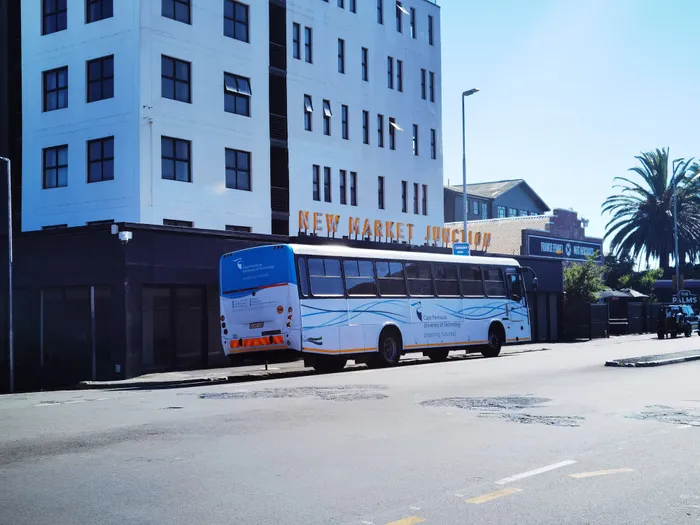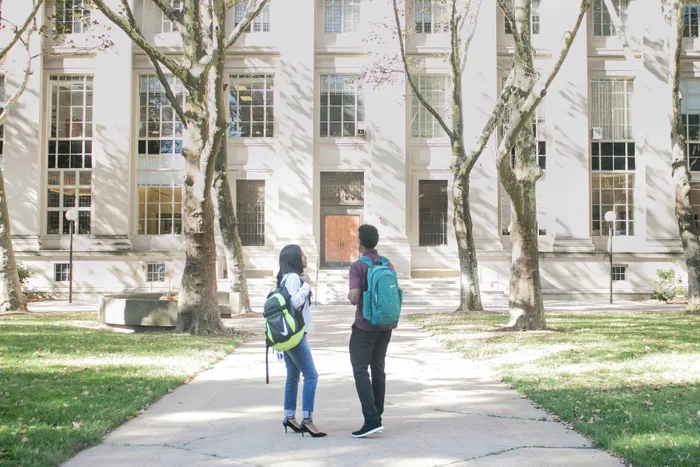
A picture of South Point, a privately owned residence accommodating students from Cape Peninsula University of Technology (CPUT).
Image: Sisonke Mlamla
The student accommodation landscape in the Western Cape, particularly in Cape Town, is defined by a systemic supply-and-demand imbalance that creates persistent challenges for all stakeholders.
The significant and chronic shortage of safe, accredited and truly affordable beds is made worse by the region's high property values and rental costs, says the South African Student Accommodation Providers Association (SASAPA).

Students.
Image: UnSplahs/The Jopwell Collection
Talking to Independent Newspapers, SASAPA ceo, Inga Ncomanzi, says what stands out about this sector in the region is "a broken financial model where a core issue is the significant disconnect between the actual cost of providing compliant, quality accommodation in high-value areas such as Cape Town and the capped allowances provided by NSFAS".
“This creates a challenging environment for providers who want to serve the NSFAS market sustainably.”
The association that advocates and promotes the interests of accommodation providers in South Africa adds that students' vulnerability is high.
Before the introduction of regulated portals, students faced significant risks, including scams and substandard living conditions, while searching for housing on unregulated platforms. This created unnecessary anxiety and compromised students’ safety.
Cape Town’s student accommodation scene is unlike anywhere else in South Africa - demand is sky-high, and quality, well-managed spaces are limited, says Benji Schaffer, co-founder of Proper Living, who provides higher-end accommodation to more wealthy clients.
“That gave us the opportunity early on to be selective and shape a strong culture from the start," said Schaffer.
The Cape Town students and young professionals accommodation provider says Cape Town’s property market is one of the most expensive in the country, which naturally affects rent levels.
According to SASAPA, the National Student Financial Aid Scheme (NSFAS) brought much-needed regulation and a safer portal to students, but sent shockwaves through the market.
The organisation says the introduction of price caps and a centralised accreditation process fundamentally altered the operating environment for accommodation providers, especially larger, established groups.
Upcoming academic year preparations
Ncomanzi says preparing for the upcoming academic year involves navigating a new regulatory environment and mitigating operational risks. He says their members are focused on a multifaceted approach to ensure they can provide stable housing for students.
The preparation entails navigating the NSFAS framework as members engage with the NSFAS portal to ensure their properties are accredited and their listings are approved.
“We are actively working with the scheme to resolve the logistical and payment challenges that have created instability in previous years.”
The association says that in light of recurring NSFAS payment delays, providers are forced to manage cash flow carefully and build financial resilience.
With regards to maintaining accreditation and standards, SASAPA says its members are committed to upholding the minimum quality and safety standards required for accreditation. “This is a non-negotiable aspect of our service to students.”
The organisation says it continues to advocate for its members by engaging with institutions, NSFAS, and government bodies to address systemic issues and improve the overall functioning of the student housing ecosystem.
Impact of high property cost
Ncomanzi says the high cost of property and rent in the Western Cape directly drives up student accommodation rates, making affordability a persistent challenge.
“The NSFAS allowance caps, while an attempt at regulation, have not adequately accounted for the market realities of this region, creating financial strain on both providers and students.”
To deal with this, SASAPA says as a representative body, they cannot control property market prices but work to mitigate the effects through strategic advocacy and collective engagement.
They are advocating for a revised funding model. “We continue to lobby for a revised NSFAS model that takes regional economic realities into account. This is crucial for ensuring that the allowances provided are sufficient to cover the true costs of quality accommodation in places like Cape Town.”
The organisation says a primary function is to engage NSFAS on behalf of its members to resolve payment delays and address issues related to capped allowances. It says this is essential for the financial stability of providers and, by extension, for securing housing for students.
Ncomanzi says they are promoting models that strike a balance between providing affordable, high-quality housing for students and ensuring the financial sustainability of accommodation providers.
Independent Media Property
Related Topics: